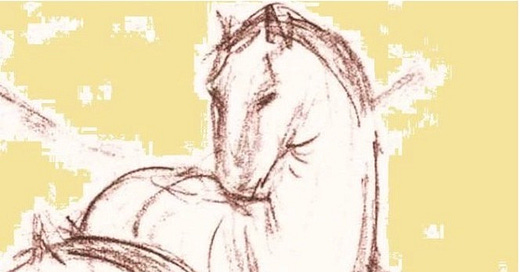PART II – THE TRAIN
The Field Where the Train Runs
My uncle ran a small farm. He boarded two chestnut draft horses in his barn and grew field corn. Just a few fields with a tin-shingled work shack languishing during the summer in the drone of locusts and a deep purple rambling of pokeberry. Uncle Henry sat in there most of the time he wasn’t working, and when we visited as kids it smelled of all I knew of old men: of spit tobacco, sweet hay, manure, and a strange, lingering smell that I would later recognize as alcohol. There was a vise fastened to the work table in there, and my brothers and I would collect hickory nuts and crack them in it; it was the only way you could eat them. The horses, big Belgians, were called Leo and Tod, and I always thought these were very small names for such large, gentle, snorting beasts.
Uncle Henry . . . bachelor uncle, older, so different from my father, yet so familiar; the Stoughton heritage, blood running through our veins. I thought of him as an old man although he was only in his late forties, lean and strong. The farm and man fascinated me as a young girl like a foreign land: the dirt, the unadulterated maleness, the smells, the beauty; over the years its spell held, close to my mind and heart. In the late days of summer, we stood on the back of the flatbed, throwing corn into the silo bins to dry, husk bits in our hair and eyes, unaware of what these fields would become.
Uncle Henry shut himself off from love and the world in that shed of his. But both came to him anyhow about the time I turned nine, first in the form of a shabby carnival operation that set itself up every Saturday evening in July at the fairgrounds at the other end of town and drew folks from all around to play bingo or sit on benches in front of the bandstand listening to that week’s draw on the bluegrass or big band circuit. Let loose there amid the out-of-towners, amid the adult smoky haze of cigarettes and the smell of frying fat, my brothers and I would eat cotton candy first so as to form a sticky film over ourselves that attracted all possible grime, then would stand on and lean over the white slat fencing that surrounded the various booths and toss pennies or wooden hoops in order to win balloons or a case of orange soda. Once I nicked a bubble gum cigar off the candy stand and spent the night waiting for the police to take me in.
The carnival company—Freeson & Company, I think it was—outfitted two rides. Clearly the more popular of the two was a contraption that went round in circles, its boxy, banged-up cars lifting some six feet off the ground then gliding back down, up and down as they traveled the circumference. Certainly, it was doubtful it would pass inspection or was ever put through one. It screeched and shouted danger and thus was a magnet for the younger crowd, as was its dark-eyed, dark-haired operator, jerking the gear shifts with a charming, bored nonchalance, making the thing shudder into life. The other ride was a small train that ran on a track in the rear of the carnival grounds. We turned up our noses at its staidness.
Freeson & Company signed a contract with Uncle Henry to store their extra equipment in his barn during the summer circuit when they ran their northern tour in our part of the state. He had adequate space and was centrally located. Come Labor Day, they’d pack up and head south. Extra train track sat stacked next to the salt lick blocks. The abandoned blue and red ride car with a foot-and-a-half long crack running down the middle of its floor became a bigger attraction for us to visit than Leo and Tod. We would sit in the cab and pretend we were race car drivers. Freeson & Company was not long for this world, however, and one early June, when our summer expectations were just rising, a truck appeared at Uncle Henry’s farm and two muscular men unloaded the train engine; Freeson & Company had gone bankrupt, the equipment sold off on the cheap. Everything except the train engine. A “buyer” was coming by to claim the engine and reimburse him for his trouble my uncle was told. But he had no wish to be saddled with this arrangement and told the men to put it back on the truck and take the rest of the junk with them. The driver, clearly the one in charge, said, “No can do; not touchin’ it,” and the men got back in their truck and drove off. So the engine, as big as a small horse, was pushed over on its side onto an old door, and Leo and Tod dragged it into the barn to be put with the rest of the seedy reminders of careless fun. Better off gone but still there, like a tattoo. It had sat there for two years (no one ever came to claim it) when the Nelsons moved to town.
Image: Leo and Tod. Source: Detail from "Two Horses in Mountainous Landscape," Franz Marc, date unknown [Public domain], via Wikimedia Commons, edited by J. Weigley



